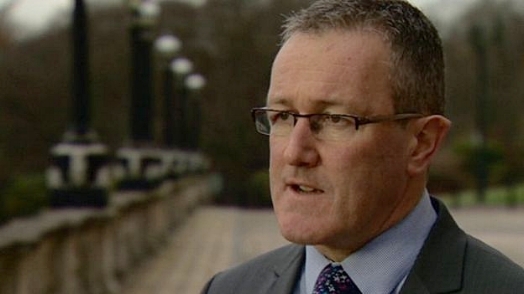Third in our series on articles concerning water charges in Northern Ireland, this is an extract from Sean McVeigh's 'Sinn Fein In Government' published in 2012 in Irish Marxist Review. Although we concentrate on the 'Privatising Water' chapter, we strongly recommend readers to read the full article downloaded from the above link.
PFI stands for Private Financial Initiatives, a way of creating "public–private partnerships" (PPPs) by funding public infrastructure projects with private capital.
Original photo of Stormont by http://www.flickr.com/photos/robertpaulyoung/
Sinn Féin in Government
Privatising Water
Until May 2011 Sinn Fein minister Conor Murphy was in charge of the department of regional development which oversees public transport, roads, and water infrastructure. In preparation for full privatisation NI Water became a government owned company in 2007 (just before the Executive returned from suspension) with the aim of becoming ”self-financing” within three years through the introduction of domestic water charges.
When SF’s Conor Murphy took over the department in May 2007, he allowed NI Water to continue to prepare for the introduction of water charges on domestic properties by installing charging meters in every new house built in Northern Ireland. The fact that water charges have been continually deferred is evidence that both Sinn Fein and the DUP are fully aware that such a move would lead to mass resistance that could threaten the tribal basis of the Stormont regime. Murphy also continued the policy of handing over water infrastructure to be run by private companies under PFI deals. Under a deal signed with the consortium Dalriada Water Ltd in 2006 worth 110 million, the private sector will soon deliver 50.
When the deal was announced by direct rule ministers, the Stormont administration was in suspension and SF opposed the PFI contracts. But when SF got back in government in 2007 the party suddenly found merit in the PFI arrangements and Murphy presided over the transfer of large parts of the water network to the private sector.
The biggest company involved in Dalriada Water is California based multinational Aecom. This company specialises in taking over denationalised public utilities and has gas, oil and water interests around the globe.
When opening a water treatment facility in Antrim constructed with the help of Aecom in 2009, Murphy praised the PFI project saying it would ”deliver an efficient, cost effective and high quality water source”.
Sinn Fein has played a key role in shaping the activities of NI Water because Murphy as DRD minister appointed a number of directors of the company. One of Murphy’s appointments was Lawson McDonald, a director of Global Armour Ltd, which supplies body armour to the SAS and other British forces in Afghanistan. The SF minister also appointed Padraic White who as former Managing Director of the Republic’s Industrial Development Authority was lauded as one of the architects of the Celtic Tiger. White is husband of Fianna Fail senator Mary White. These are the people - put in place by Murphy - who have shaped the direction of NI Water and are moving the company towards full privatisation with the always present danger of the introduction of metered domestic water charges.







